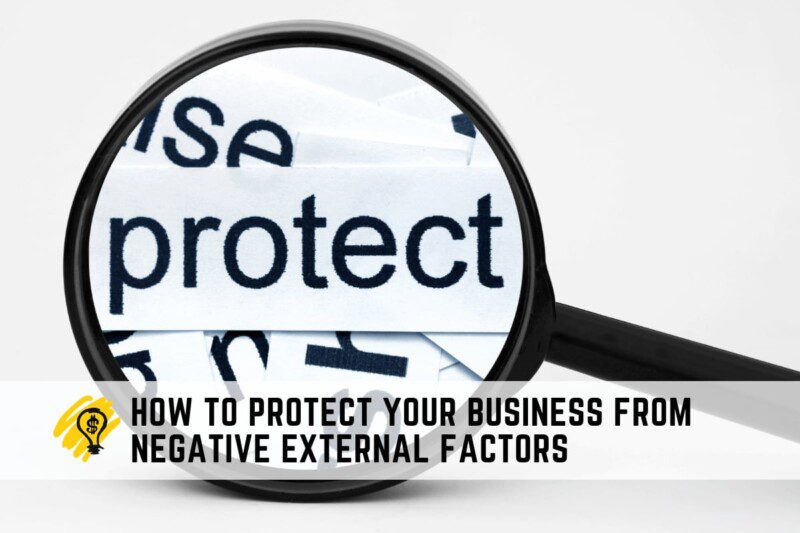The business sphere is an ever-evolving landscape of ups, downs, setbacks, and opportunities. While your business could be prosperous in one moment, it can also be struck down just as quickly if you don’t protect your business from negative external factors.
As a definitive example, consider the COVID-19 pandemic. The tourism, airline, and hospitality industries have taken a huge blow because of it, with a handful of businesses shutting down and many more restructuring their operations to cut costs.
While hardy businesses have started to regain traction, many brands have already succumbed to external factors due to their inability to adapt to the abrupt change in the status quo.
The role of a savvy entrepreneur demands more than just product knowledge and team management. It also requires an understanding of the world around them and how it ties into their business.
If you want to protect your business from unforeseen risks, here are a few ways you can keep your venture protected.
1) Understand the Economic Climate
No successful business operates without understanding the economic environment they are in. As such, it’s important to keep track of macroeconomic trends and adjust your operational strategies accordingly.
For instance, the ongoing recession and surge in inflation have massive ramifications on your business’s cash flow, even if you don’t feel it. This shows up in the form of reduced consumer spending, increased cost of production, and decreased access to credit.
Preparing for such eventualities is necessary for businesses to stay afloat during tough times. This way, you can take proper action depending on the circumstances.
Related: 5 Legal Actions That Will Make Sure Your Business Is Protected
2) Build a Capital Reserve
No matter how long you’ve been in the business, one thing is for sure—unexpected risks are inevitable.
From a competitor overtaking you to a tax hike, there are a plethora of events that can severely impact your business’s performance.
What you can do to minimize their effects, however, is to focus on the things you can control to weather these events.
One excellent way to do that is by building a capital reserve. This serves as a financial cushion that your business can fall back on in times of need.
By keeping a reserve for your business, you’ll be able to maintain your operations without the risk of bankruptcy dawning upon you in the upcoming months. This gives you enough time to plan and execute a new strategy for your business to stay relevant and profitable.
3) Mind Your Cash Flow
While having a capital reserve is important, it’s equally crucial to ensure that your business operations are funded most efficiently.
The most straightforward approach is to audit your cash flow from time to time. This means taking some time out of your day to look at your company’s balance sheet and income flow statement and ensuring that there are no discrepancies in the numbers.
Besides ensuring accuracy, reviewing your cash flow can also help you avoid spending on a service or product that’s no longer needed by the company.
If you have a financial department or staff to handle this for you, you may also have them review your current expenses and send you a report for any abnormalities. By doing so, you can save more business money and put it to better use.
4) Tap Into Good Insurance Policies
It’s one thing to face a minor expenditure increase due to an ongoing recession, it’s another thing to have your entire office building catastrophically wiped out by a fortuitous event.
This is why having an insurance policy in place is essential for any business. Insurance policies like commercial property insurance provide a layer of protection against unexpected risks. There are also earthquake and flood insurance policies to protect businesses from natural disasters.
Having a barely-utilized insurance policy may seem like funds going down the drain, but when tragedy strikes, you’ll be thankful for having it.
Besides the aforementioned insurance policies, there are many other types of insurance to choose from. Choosing the right one will depend on your business’s model, the industry you’re in, and the size, among other things.
Here are a few of the most popular insurance types that businesses typically invest in:
- General liability insurance
- Business income insurance
- Workers’ compensation insurance
- Data breach insurance
- Commercial auto coverage
- Business owners policy
By investing in the right insurance plan, you can stay protected even when met with accidents that are out of your and your business’s control.
5) Invest in Safety
Just like insurance policies, investing in proactive safety and security measures is one of the best ways to give you peace of mind when running your business. Preventing criminal acts like theft, harassment, and vandalism are guaranteed to cost much less than dealing with them after they occur.
You may want to consider installing a robust security system, hiring a guard service, or establishing strict policies and procedures.
Furthermore, while instilling a culture of trust is key to a sustainable company, it’s equally essential to implement proper protocols to dissuade employees from engaging in workplace-related crime.
LY Lawyers’ explanation of a white-collar crime states that it’s when “an individual [commits an action] for personal financial gain”. Running security checks on your staff periodically, installing a good cybersecurity system, and having a good inventory management system in place are a few of the measures you can take to protect your company from any fraudulent activities.



